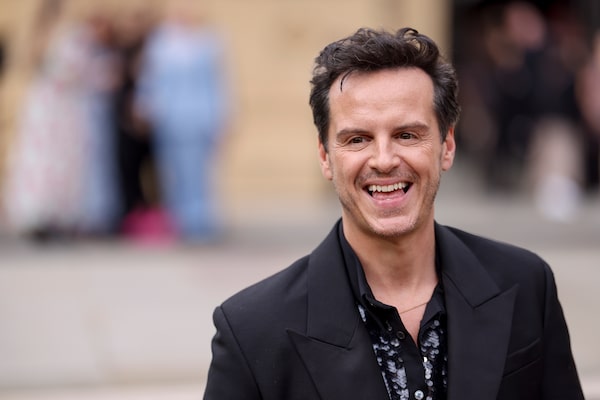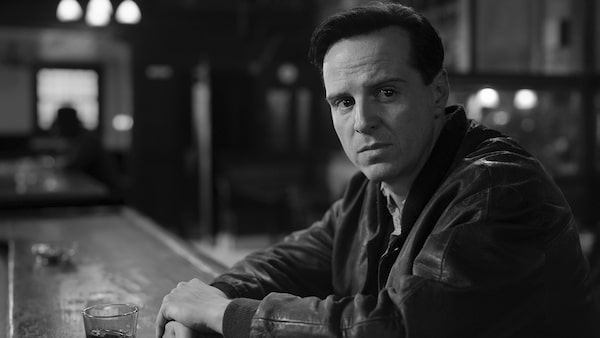
Andrew Scott arrives at the Olivier Awards on April 14 in London.Vianney Le Caer/The Associated Press
Tom Ripley is not a psychopath. Not the way Andrew Scott plays him in Ripley, the eight-part Netflix series adapted and directed in creamy black and white by Steven Zaillian (The Night Of), despite the fact that Tom does commit murder. The point of the series – the delicious disquietude of it – is to elongate Patricia Highsmith’s source novel. To unwind what was compressed in Anthony Minghella’s 1999 film The Talented Mr. Ripley. To idle with Tom long enough to see beyond “monster” or “villain” to “person.”
“The main task in playing any familiar literary character is to unlearn the reputation the character might have,” Scott, 47, said in a recent phone interview, as Ripley debuted at No. 8 on Netflix worldwide. “When I was playing Hamlet” in London in 2017, “I wanted to not play the obvious expectations, the easy three-word label – ‘the dark prince’ – and to think instead about who he was before his father died. Which according to the text was someone quite funny.”

Andrew Scott as Tom Ripley in a scene from "Ripley."Courtesy Of Netflix/The Associated Press
In the same way, Scott’s Tom, a small-time grifter in 1961 New York who is hired by a shipping magnate, Herbert Greenleaf (Kenneth Lonergan, the playwright and screenwriter), to bring his wastrel son Dickie (Johnny Flynn) home from an extended, expensive holiday in Italy, “isn’t bloodthirsty,” Scott continues. “He’s absolutely not a natural born killer. He feels uncomfortable. He makes loads of mistakes.”
Most significantly, “Tom is on the outskirts of society and he gets transplanted into high society. He realizes there are people there who have half the talent with double the confidence and exposure to the most beautiful things in the world. That ignites a rage within him. I think it’s a rage we can all understand. We may not go to the lengths he does to express that rage. But characters can only be fascinating if we feel they reflect us in some way.”
This supple empathy is Scott’s superpower, whether he’s playing a lonely screenwriter in All of Us Strangers; a spendthrift king in Catherine Called Birdy; a madcap lord in The Pursuit of Love; or every Uncle Vanya character in Vanya: National Theatre Live. (In one gobsmacking Vanya sequence, he alternates, seamlessly, between a character who is crying and one who isn’t.) In Sherlock, it’s what made his Moriarty such a liquid foil for Benedict Cumberbatch’s Holmes. In Fleabag, it’s what made the Hot Priest hot.
With Ripley, “it’s unusual for a television series to spend so much time in the company of one character,” Scott says. “Usually you’d spend that time with a large family, or a police department, or a hospital. But we replicate the first-person singular of the novel.” We observe Tom as he climbs magnificently crumbling staircases, checks into sumptuous hotels, learns to speak Italian, is knocked sideways by the glories of Caravaggio. We watch him be, and think, and give into yearning. The series tours us through holiday destinations, but off-season, which adds to the feeling of disorientation.
“At any stage the journey could end for Tom,” Scott says. “Dickie could find him out, the police could. He’s an incredibly vulnerable character, vulnerable to poverty in New York, vulnerable to the whims of these high society people,” which include Dickie’s skeptical girlfriend Marge (Dakota Fanning) and outright hostile friend Freddie (Eliot Sumner, child of Sting and Trudie Styler), who are casually cruel about Tom’s economic status and presumed homosexuality.
“There’s a murkiness to the way people spoke about sexuality at that time,” Scott says. “Everything was subterfuge, spoken in code. People couldn’t really admit to anything that wasn’t a heterosexual lifestyle.
“But I was reluctant to attribute any labels to Tom – his nationality, age or sexuality. I see him as a very othered character. Certainly queer in the sense that he’s not invited to the party. I think his sexuality is elusive, like the rest of him. I don’t think he’d be comfortable in a gay bar, but I don’t think he’d be comfortable in a straight bar either. Any easy answer to do with Tom reduces him.”
Scott, who was born and educated in Dublin, then moved to London at 22, doesn’t usually take his characters home with him. But Ripley’s isolation presented challenges to him as a person as well as an actor.
As a person, “my great joy in life is connecting with people,” Scott says. “I’m not suspicious of people in the same way that Tom is.” Though his fame post-Fleabag has been challenging – “I do feel I have to protect myself. Fame can detract from who you really are. By putting someone on a pedestal you can dehumanize them. It’s something I keep an eye on” – he believes that if he keeps making work that means something to him, and delivering it with enough authenticity, he can continue to connect, and “people don’t become the enemy.”
As an actor, Scott’s challenge was to find “where Tom’s heart may be, in this dark world we’re examining, where a lot of the characters, not just Tom, are quite morally ambiguous, and not ultimately that generous,” he says. “For me, it’s when Tom’s on his own, looking at beauty. He has a strange affection for things. He likes handsome hotel clerks. He’s moved by art and music. He’s just never been exposed to it in the way the privileged characters are.
“I think that’s what Highsmith is really talking about,” Scott concludes. “If you dismiss certain people and deny them the art and beauty that other people in the world have, a darkness arises. And people go to great lengths to rebalance that lack of dignity.”
Sign up for The Globe’s arts and lifestyle newsletters for more news, columns and advice in your inbox.